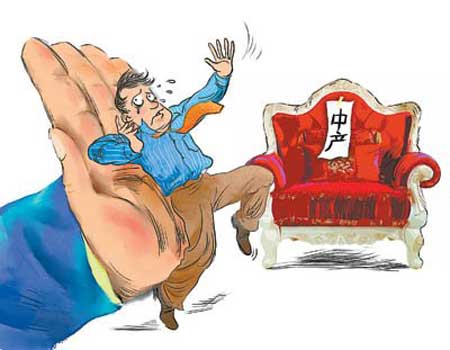China's middle class hangs in the balance
A sizeable number of people in China, who are classified as being in the middle class, are worried every day about owning or paying for a home, a car and dealing with credit cards, People's Daily reported Thursday.
 |
|
China's middle class hangs in the balance |
The Asian Development Bank released a report in August that said 817 million people, or about 62 percent of the population in China, belongs to the middle class, based on a standard daily spending of US$2 to US$20.
The bank's report added fuel to an ongoing heated debate over the size of the middle class in China.
A person on an Internet forum mockingly said: "I was factitiously put into the group, again."
According to a report from the Chinese Academy of Social Sciences (CASS) in Feb-ruary, China's middle class - people with an annual income of 60,000 yuan (US$8,800) to 500,000 yuan - accounts for 23 percent of the country's population.
Another report released jointly by Beijing University of Technology and the Social Sciences Academic Press in July showed that 5.4 million people in Beijing are in the middle class, accounting for 40 percent of the capital's population, based on the standard of household monthly income of 10,007 yuan.
Although the figures vary, members of the general public aren't convinced.
A survey conducted by sina. com in July, a major news portal, said that 60.6 percent of 13,887 responders believed a person in the middle class should have a monthly salary higher than 12,000 yuan.
The website themiddleclass.org, which analyzes US legislation and its impact on its middle class, offered a precise description of middle class people.
"Over the past 50 years, the middle-class standard of living in the US has come to mean a secure job, a safe and stable home, access to health care, retirement security, time off for vacations, illness and the birth or adoption of a child, opportunities to save for the future and the ability to provide a good education, including a college education, for one's children," it said.
The middle class in China, however, is worried about mounting home prices and the high cost of living, overburdened work and uncertainties about the future, People's Daily commented.
"They will be immediately kicked out of the middle class category if they have any problems with their employment, health care or their children's education," it said.
Li Shi, a scholar at Beijing Normal University, said China's burgeoning economy can't defuse the anxieties of middle-income people, as the surging inflation and unfair income distribution system have made it even harder to maintain the current standard of living, let alone move into the upper class.
In fact, a survey done by Nanjing University sociologists among residents in several major cities including Beijing, Guangzhou and Wuhan between 2003 and 2005, showed that 85.5 percent of urban residents felt they belonged to the middle class.
 0
0 






